FAQ’s About Hair Loss
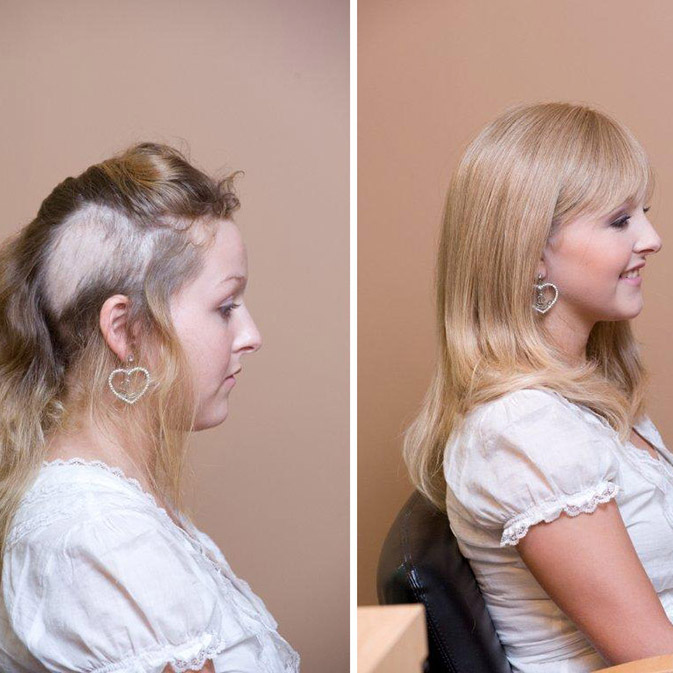
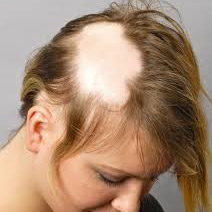
Alopecia
Who is affected by Alopecia Areata?
Men and women of all ages and races are affected by Alopecia Areata. Most people usually start experiencing the first symptoms at a very young age. It’s not life-threatening, however, most people do experience a major psychological impact as a result of the disease. People suffering the consequences of Alopecia Areata are still very capable of living happy, healthy and fulfilling lives. There is absolutely no reason the condition should prevent you from living the life you want and deserve.
To learn more about Alopecia and what can be done for you, check out this resource.
What are the causes of Alopecia Areata?
Alopecia Areata occurs when inflammation develops around the hair roots, which then become inactive and diminish in size. The scientific community has no answer for what causes this inflammation. However, the cause is most likely more complicated than a simple deficiency of vitamins and other micronutrients, hair care methods or external damage. What causes Alopecia is neither any fungal bacterial or viral infection and thus it cannot be passed on to any other person. Many people believe the condition to be stress-related, but there is no significant scientific evidence that supports this.
Is Alopecia a lifelong disease?
Unfortunately, Alopecia Areata is an in-curable condition. There are different forms of Alopecia, one of them, Alopecia Totalis, is a condition involving complete loss of all the hair on the scalp. It makes up for roughly 20 percent of all people suffering from the disease. Those who suffer from Alopecia Totalis also have a greater tendency for the symptoms to occur again.
Can I still do sports?
Absolutely. The main reason of finding your perfect hair restoration solution is for you to be able to live your live just as you’d like. You should never have to sacrifice a single thing that you love. No matter your sport or activity of choice, you will be able to keep doing it just like always.
Hair Regrowth
Will my hair grow back?
Most people suffering from Alopecia Areata experience some extent of hair re-growth. Because the growing cells that supply the hair follicle remain active, it’s still possible for the hair to regrow and the possibility of complete re-growth remains.
There’s also a possibility for the symptoms to fade or reoccur at any point in time. There’s no telling exactly how Alopecia Areata will affect you, which makes the condition very unpredictable and difficult to manage. You might only lose a single patch of hair and then experience a full re-growth without further recurrence. Although not very common, you may lose all your body hair with no further re-growth. Experiencing hair loss followed by re-growth over the span of many years is common. Your re-grown hair can be of any colour and texture, from thin, downy white hair, to hair indistinguishable from your original hair.
Check out this article to find out what you can do to experience better hair regrowth results.
What if I’ve left it too late?
It’s never too late to take positive action … especially when you consider you have approximately 100,000 hair follicles on your head and they grow roughly one centimetre each month.
Now I know you may be thinking that some of these little babies may have already shut down. That could be true, but what if you could stop any more from going the same way?
Wouldn’t that be better than watching your hair getting thinner and thinner?
Wouldn’t that be better than waiting for that crippling comment from a dear friend, “what happened to your hair? You used to have such a great …”
You get the picture!
What’s the next step? Take action today and contact us for a consultation!
Can my thin hair grow back?
To maximise the possibility of your hair growing back, it is important to do everything you can to reduce the stress in your life. Stress is actually a big contributing factor to thinning hair. If stress is the only factor, the hair loss is normally temporary and will grow back once the stress you experience has subsided. For many people, stress can also speed up other forms of hair loss like male pattern baldness.
How many phases exist in hair growth?
Naturally, hair grows in three phases: catagen, telogen and anagen. Anagen is the phase in which the hair is actively growing, while catagen is the relatively short phase of the natural hair cycle in which hairs start to break down. Telogen is the resting phase. The hairs that fall off daily are generally in the resting or late phase of the hair cycle.
Check out this resource for tips on how to prevent hair loss and regrow your hair.
What options are available for hair regrowth?
Unfortunately, there are not a great deal of workable options for hair re-growth. It all depends on how severe the loss is. We only use products that are known for actually stimulating new hair to grow. Some of the options we use include shampoos, scalp moisturisers, topical solutions and camouflage fibre sprays.
We recommend a special treatment to stimulate growth based on your individual needs. Schedule a free consultation today to get to know the various options we have for you or check out this resource that explains how we use natural hair regrowth treatments to treat hair loss or hair thinning.
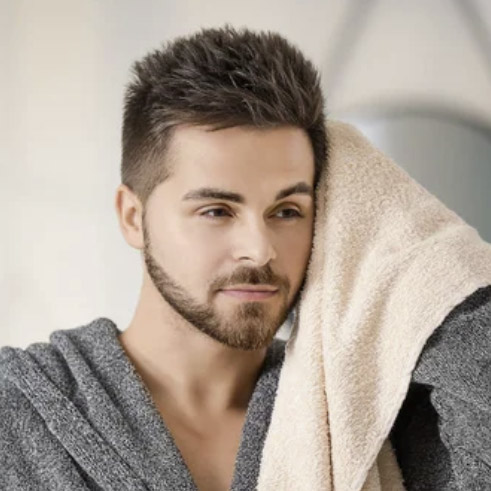

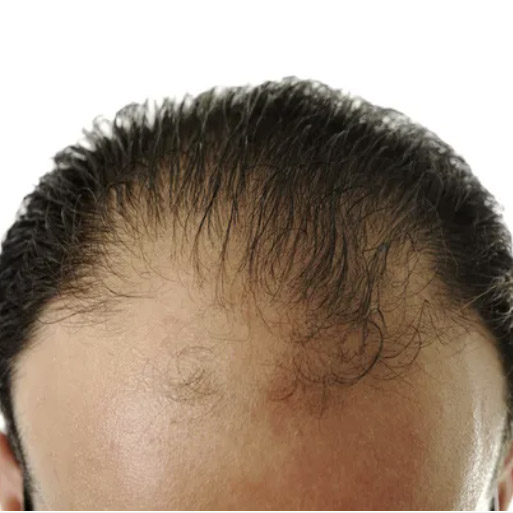
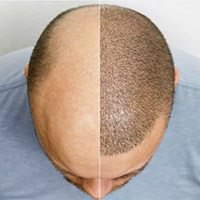
Hair Loss
What causes male hair loss?
There are a number of reasons why men seem to fall prey to hair loss. And while they may have different origins, the end result is the same…missing hair!
Some of the most well-known are …
- Genetic
- Hormonal
- Stress
- Diet
- Medications
To learn more about male hair loss and its solutions, check out this useful resource.
What is male pattern baldness?
Male pattern thinning causes a great deal of anxiety for men of any age. There are a number of treatments available for any male who genuinely wants to stop this problem. First of all, we suggest you take a look at our article that gives insight into the various options available for hair regrowth and lets you fully understand its nature and solutions.
For more information, check out this useful resource that gives a more in-depth explanation of male pattern baldness, its causes and how it can be treated.
How can I avoid hair loss problems?
The first step in any hair loss prevention program is just that, prevention. Easily said but not as easily accomplished is the underlying cause of genetics. Healthy nutrition, correct hair care and a reduction in stress levels all help with hair loss problems, but the advice of a professional Hair Loss specialist is the way to go if you are serious about preventing future problems.
Check out this article on natural hair regrowth for a more in depth explanation of the various options to treat hair loss.
What makes hair fall out?
Apart from any underlying causes (medical treatments, undetected diabetes or lupus); one of the biggest problems in maintaining a head full of rich hair is scalp infections.
When stress levels are added to the mix (an often unrecognized and overlooked symptom), delayed hair fall-out is the result (sometimes up to 3 months later).
To see what you can do about your hair loss – have a look at this resource about natural hair regrowth solutions.
Should I consider hair loss treatment?
If you have any concerns about how your hair is growing or behaving, it’s a wise decision to see a Hair Loss professional for an opinion.
After all, isn’t it better to head-off any problem before it becomes too hard to treat?
Contact us today for a consultation!
How do I prevent my hair from thinning out?
7 simple tricks to reduce thinning hair and keep your thick locks include:
- Up your protein. Nuts, milk, meat and fish are all great sources of high-quality protein that do wonders for your hair.
- Always use conditioner.
- Take care of your scalp.
- Stay relaxed.
- Listen to your body’s needs.
- Make sure your vitamin levels are balanced.
- And your iron levels too.
For additional tips on how to thicken your hair naturally, check out this article on 5 easy hair loss treatment tips for thicker hair.
Why does hair loss happen, and can it be stopped?
Hair loss in men is caused by DHT blocking the hair follicles. This causes the hair to become finer as it grows. It then falls out when there is no room left in the follicle for the hair to exit through. Not all men lose their hair, but it is common and is normally caused by either the mother’s or the father’s genes. You can’t stop the progression of hair loss once it starts, but you can certainly slow it down. Natural regrowth treatments, or non-surgical grafting, have been shown successful. Female hair loss is mostly caused by a hormonal imbalance, which can be diagnosed as female pattern thinning.
To learn what techniques you can implement right now to prevent hair loss, check out these 5 natural hair loss treatments tips.
What types of natural hair loss treatments are available?
- Try a scalp colouring product to minimize the contrast between your hair and scalp if it’s beginning to show through.
- Try a hair thickening solution like our Mane Hair Thickening Spray.
- Use hair extensions to enhance volume.
- Keeping your hair short rather than long will make it appear thicker.
- Parting your hair to the side takes the focus off the crown of the head, which is the area where hair often thins.
- Using body-boosting hair products can give your hair a thicker appearance.
For more information, check out this useful resource that goes through some of the best natural hair loss products to restore your luscious locks.
Is it normal to lose 100-150 hairs per day?
Yes. We all lose some hair on a daily basis. In fact, losing up to 100 hairs a day is very normal and is not a result of going bald. The scalp has around 100,000 hair follicles and the majority of them are in a constant state of producing new hair.
Why do some women lose hair?
Without a doubt, the most common cause for women’s hair loss is female pattern baldness. Many other possible causes include:
- Childbirth
- Stress
- Chemotherapy
- Surgery
- Rapid weight loss
- Anemia
- Ongoing illness
- Certain medications
- Hormonal changes as a result of thyroid conditions, birth control and menopause
To learn more, check out this article on what causes hair loss in women and what you can do about it.
Hair Transplant
My hair is thinning, but I don’t want surgery. What options do I have?
Luckily, we have a number of effective non-surgical options available. Before we make a recommendation to you, it is important to go over many of the options we have based on your unique needs, the degree of your hair loss, activities you participate in and more. Having these factors in mind is a crucial part of finding a solution that works for you.
What is a hair system?
A hair system has many names and are often called a unit, toupee, wig, top volumizer, hair systems and hair piece. A hair system can be made of different medical-grade materials. For instance, there are poly bases, which are similar to a rubbery membrane. A different option is lace bases, which come in different strengths depending on the individual’s needs.
Check out this article to learn more about our hair-systems.
How much does non surgical hair replacement cost?
For a custom ladies hair-system the prices start at $2600 and can go up to around $7000, depending on your needs. Our custom hair-systems for men start from $1400 and depending on what program is chosen and price increases from there depending on each individual’s unique needs and requests.
Contact us today to chat with our experts about our pricing, services and how we can help you.
What is a non-surgical hair transplant?
With the help of non-surgical hair transplants you get a full head of hair without having to endure any invasive surgery. We offer a solution for men and women of every age and ethnicity, no matter your degree of hair loss. The best solution for you depends on your individual needs. Non-surgical hair transplants offer a faster and less costly solution than surgical hair transplantation.
Take action today and schedule a free consultation to learn which option is best for you. Also, learn more about our non-surgical hair replacement solution.
What’s the difference between Hair Replacement and Hair Restoration?
Hair replacement is covering the area of loss with a non-surgical hair system. Hair restoration is trying to keep the hair already there, and get it stimulated again to keep it healthy and growing.
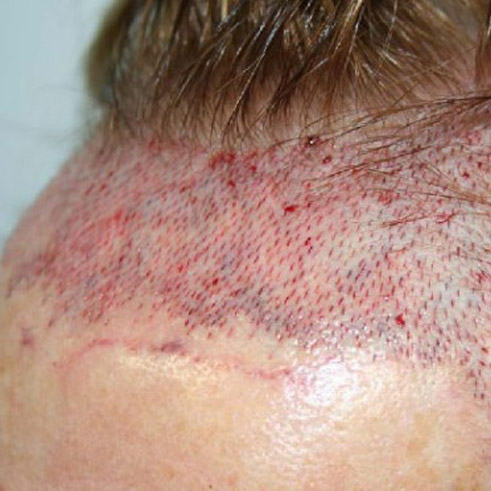
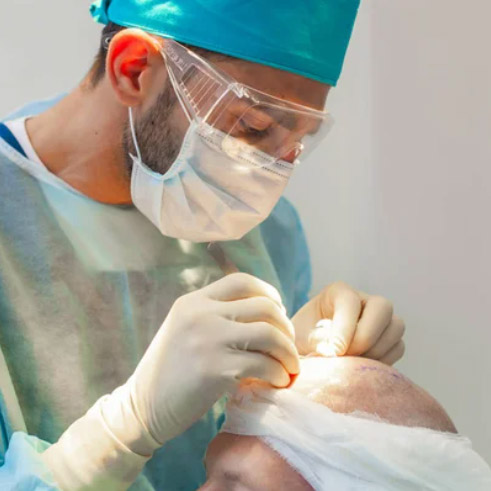
Brisbane Hair Loss Treatment Reviews
Recent Hair Loss Treatment Results






